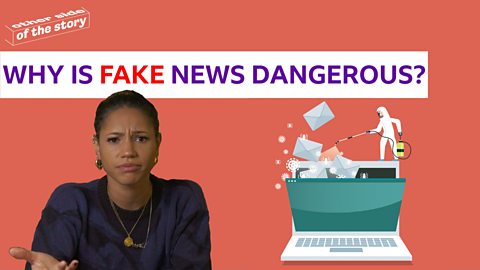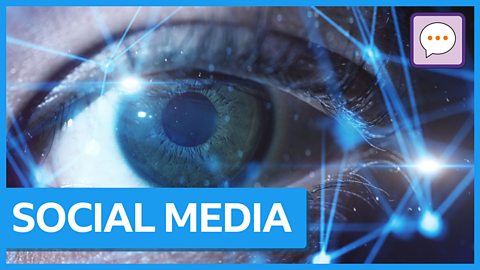We all love a bit of drama, but usually thatтs how fake news spreads. Often scandalous stories are written to make us feel angry, sad, surprised or shocked т anything to get us to share!
Radio and TV presenter Vick Hope, with the help of some willing teenagers, finds out how fake news plays on our emotions and why we should pause before we shareтІ
Vick Hope: Emotions! We share them all day. Quite often we donтt say anything, the right emoji does the job for us. We feel. With fake news, we feel a lot. Latest research shows that only two percent of young people can spot fake news. With a bit of know-how, thereтs no reason we canтt change that figure to 100 percent. Fake news deliberately plays on our emotions and itтs our strong reactions that make us want to hit the share button, understanding how this works is the first step to fighting back.
Student: All fake news is based off a feeling.
Student: Itтs all about making something boring really extreme.
Student: When we share things itтs because weтve felt an emotional connection to it.
Dr Radha Modgil: So fake news affects our emotions in two ways. It contains dramatic and emotional headlines and words to drag us in, like best, worst, terrible, exciting, they really provoke an emotional reaction and often the stories also contain the word тyouт, so you feel directly affected and drawn in by the story.
Student: People do make headlines that are quite extravagant to draw people in.
Student: Everythingтs got to be really dramatic and in capital letters.
Dr Radha Modgil: Then once itтs got our attention it then causes a really strong emotional reaction in us, so we feel we have to share it. Thereтs an area on our brain called the amygdala which actually responds to emotional drive and that becomes over-activated or has increased activity when weтre reading a fake news story. Studies have shown that actually it only takes one 250th of a second for us to react to emotional content, so basically that means that thereтs no time at all for us to think, respond and critically analyse that information. Fake stories leave us at the mercy of our basic instincts.
Vick Hope: Because of the way it works on our emotions, once you share a fake story it will travel much faster and further than a real one.
Alastair Reed: Everything emotional online travels faster and whether itтs gossip or whether itтs sensational lies about someone or something, itтs much more interesting often than quite boring or complex truths so people are much more likely to share it.
Vick Hope: And the more you see fake stories the more your brain leads you to believe itтs true.
Student: I think if you see a story more than once youтre more likely to believe it than if you see it once.
Student: Because surely not this many people would be getting it wrong.
Student: Then you start believing it because youтve just seen it more and more, and more people are starting to share it and youтre like тOh, this must be realт.
Claire Milne: And thatтs known as the Illusory Truth Effect. So thatтs basically just the more you hear something repeated the more likely you are to think itтs true whether it is or whether it isnтt.
Vick Hope: And every time we like or share a fake story it acts like a big thumbs up, telling all our accounts that we want more and thatтs what we get. More and more fake stories.
Student: A story that I thought was real but later found out was fake would have to be the World War Three report.
Student: Conspiracies about 9/11.
Student: The coronavirus apparently coming from bat soup.
Student: But I later found out that maybe that it wasnтt true.
Student: I kinda felt tricked. How could I believe that was true?
Student: I feel really annoyed because itтs just a waste of time.
Student: Just a bit stupid that I thought it might have been real.
Student: If you can make up a news story about something that serious then what can we really trust?
Vick Hope: None of us want to be tricked by stories or information that isnтt real or true. If you feel angry or smug, or indeed anything that gets you right in the stomach itтs worth taking a second look and asking yourself what is behind the headline? Pause before you share and think if what youтre sharing is fact or fake.
Pause before you share:
- Watch out for the тwoahт т emotion fuels fake news. When you see something that makes you feel super sad or super happy, it might be playing on your emotions to get a reaction
- Beware exaggeration т words like тterribleт, тworstт, тamazingт or тshockingт add drama to a story and make us want to click on it
- Fight the тIllusory Truth Effectт т the more you hear or see something, the more likely you are to believe itтs true т even if itтs not. If a story seems to be everywhere, remember that doesnтt mean itтs 100% fact
- Check your тfilter bubbleт т social media and ads are designed to suggest stories that match your browsing habits, interests and opinions, so watch out for being taken in by fake news that sounds too good to be true!
Where next?
What's so bad about fake news?
Vick Hope gives the lowdown on different types of fake news and how they affect us.

Tips for spotting fake news online
Nihal Arthanayake looks at some simple steps which will help separate fact from fake.

How algorithms and filter bubbles decide what we see on social media
Find out how fake news can often be spread more easily in a filtered social media feed.

Fact or Fake?
Find out how to spot and stop fake news with ТщЖЙдМХФ Bitesize.
